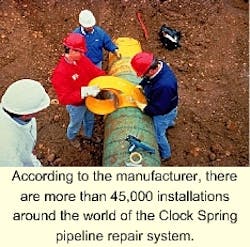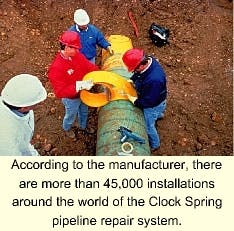Acceptance of composite repair system widens
Since mid-January 2000, the Clock Spring pipeline repair system has been included under revised wording of US regulatory rules covering pipeline repair.
Specifically, several US Department of Transportation (DOT) Code of Federal Regulations (CFR) rules now mention the fiberglass wrap system: The system may be used for dents (CFR 192.309), remedial repair of gas transmission lines (CFR 192.485), remedial repair of gas distribution lines (CFR 192.487), and permanent field repair of gas pipeline imperfections and damage (CFR 192.713(a)).
In addition, a change to CFR 195.416(f) allows operators to use the system to repair large areas of general corrosion on hazardous liquid and carbon dioxide pipelines.
US gas pipeline operators since February 1995 have been allowed to specify the repair technique through a DOT waiver.
Composite coils
The system wraps and bonds concentric coils of strong, lightweight fiberglass-reinforced isopolyester composite around the repair area, according to BP Amoco PLC.
Clock Spring Co., Houston, manufactures Clock Spring products using technology from NCF Industries, San Luis Obispo, Calif. The system is one of several NCF technologies that combine glass fibers with isopolyester resin made with purified isophthalic acid (PIA) from BP Amoco.
Among users that have installed the more than 45,000 Clock Spring applications around the world are Royal Dutch/Shell, Texaco Inc., Conoco Inc., Chevron Corp., the British Pipeline Agency, and Panhandle Eastern Corp.
Because there is no welding and related inspection, Clock Spring repair also costs less, says the company. The Gas Research Institute estimates that use of composite repairs will provide annual savings of $8.5-11.5 million to the gas transmission industry. Other GRI studies conclude the Clock Spring repair restores pipe to its original burst strength and is projected to last at least 50 years.
BP Amoco has used Clock Spring repair for offshore risers and land-based gas lines from the Shetland Islands to the Gulf of Mexico. BP Amoco Pipeline's Perry Barham says that use of two to three devices on a line cuts installation costs roughly to half of what a steel sleeve would be. "We can use a smaller crew, and we don't need welders or fire watchers," he said.

